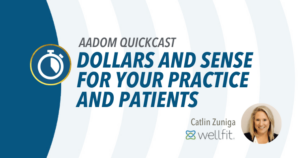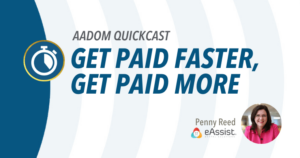AADOM LIVEcast: Money Masterclass
Approved for 1 CE towards AADOM Designations when viewed in AADOM’s Learning Management System.
AADOM Members log in HERE to watch the recording and accrue CE.
Video Description:
Merchant Advocate’s Cheryl McKenna has helped hundreds of AADOM members save money on credit card processing, while also empowering office managers to become the rock stars of their practices. During this presentation, Cheryl will go over her most important tips and tricks, including how to reduce the cost of merchant fees without having to switch processors. From the importance of PCI compliance and how it overlaps with HIPAA, to the implications of adopting a surcharge (fee passing program), Cheryl will be on hand to answer all your questions and speak about what she is seeing in the industry for 2024.
Course Learning Objectives:
- Common ways your processor overcharges you
- Explore the connection between PCI compliance and HIPAA regulations
- Learn how to protect your practice from a breach—and what it could cost you
- The pros and cons of passing on fees
- How to save your practice money and position yourself as an invaluable member of the office team
What Every Office Manager Needs to Know About Credit Card Payments
By Zena Tsarfin for Merchant Advocate
Credit card spending has more than TRIPLED in the last decade. For merchants accepting credit cards, that means billions of dollars in processing fees. While processing may be big money, very few people understand the ins and outs of this unregulated industry.
Dental offices face even more issues than a typical merchant—including software integration challenges and the high cost of accepting credit card payments, plus the collection of sensitive patient data—which makes them prime targets for increased fees and security breaches. Below, we’ll dive into how to protect your practice and reduce costs.
Software integration
Many dental offices are integrated with practice management software. Typically, these software companies work exclusively with one processor which can make it challenging to secure optimal rates on your own. Another major issue we’ve uncovered involves the software itself. If you aren’t running the most recent upgrade, it may not share all the information required by the processor, resulting in additional charges which can really add up.
What’s the deal with fee passing?
Some practices have turned to fee passing and surcharges to cover increases in processing costs, passing the cost to their customers. The guidelines and laws surrounding these programs are unclear, ever-changing and vary by state and area. Many states cap the percentage of a transaction merchants can charge and the surcharge itself is often set up incorrectly, leading to math errors and overcharging. There are serious tax implications and the possibility of fines if this is the case.
The options:
- Sign up for a registered surcharge program that only passes the fee on credit cards. If you take insurance, you will need to check with your carriers to make sure it doesn’t break the contract with the set fee you have.
- The other way is to just raise your prices, offer a cash discount yourself (no need to have the processor involved as they are just trying to make a commission), and keep the extra profit. All you need to do this is a well-priced merchant account. It is vital to become more familiar with monthly statements — particularly potential hidden or junk fees — and use these data points to negotiate lower fees. This can happen through more vigilant auditing on a company’s part or working with an expert who can help decipher these confusing statements.
Protecting your patient data
Every merchant that stores, processes, or transmits cardholder data is responsible for its protection. The Payment Card Industry (PCI) Data Security Standard (DSS) was created to help protect consumer data. Because patients’ credit card data is considered patient data, a PCI breach is also a HIPAA violation. The good news is that it’s easy to become compliant—you need to use a PCI-compliant hosting provider. EMV chip cards are an additional way to protect card-present transactions.
To ensure PCI compliance, you must implement the proper security policies, procedures, and staff training. You can start by auditing your merchant statements, which will show noncompliance via a penalty fine. Other simple steps include changing your user account passwords on a regular basis, using a third party to monitor your network security, and reviewing your physical security measures such as employee training and IT infrastructure.
The ever-evolving landscape of credit card security and compliance underscores the need for constant vigilance to safeguard both your financial interests and patient data. Increasing awareness leads to savings and less stress down the line and empowers dental offices to navigate the credit card payment ecosystem with greater confidence.
To find out more regarding any of the above topics, feel free to contact us at Merchantadvocate.com/AADOM
Learn about the presenter:
 A 24-year veteran of the merchant services industry, Cheryl McKenna helps dental Office Managers find profit within their patient payment systems. Quantifying those bottom-line contributions sets up that manager for raises, bonuses, and exciting line items on a resume: the tools needed for career advancement and personal financial gains.
A 24-year veteran of the merchant services industry, Cheryl McKenna helps dental Office Managers find profit within their patient payment systems. Quantifying those bottom-line contributions sets up that manager for raises, bonuses, and exciting line items on a resume: the tools needed for career advancement and personal financial gains.
Cheryl refuses to have a boring workday and tries to make everyone she encounters smile, laugh, or both. She teaches and consults on all aspects of electronic payments, systems, and how to save money to increase profits.
She is honored to have worked with hundreds of AADOM practices over the past 11 years.







